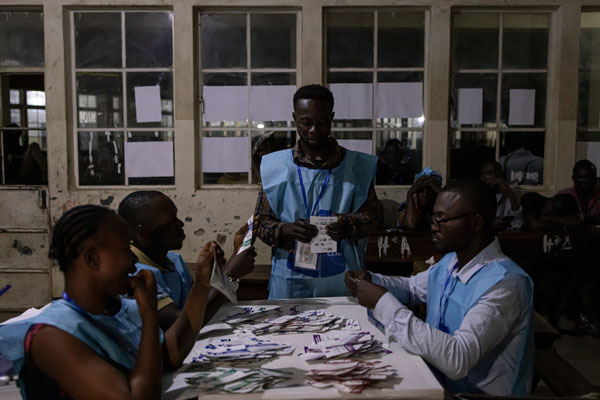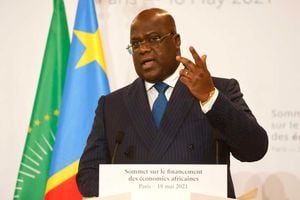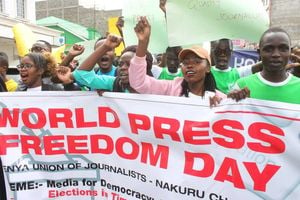
Officials from the Independent National Electoral Commission (CENI) count ballots at a polling station at the Chem Chem school in Lubumbashi, DR Congo on December 20, 2023.
As votes are counted in the Democratic Republic of Congo (DRC) election, the Nairobi Process, chaired by former President Uhuru Kenyatta, holds the best hope for peace in that long-troubled country.
First, it is a process of the East African Community (EAC), to which the DRC now belongs. For the first time, there is an engagement with Congo that is not based on lust for its famed mineral wealth that the world has been fighting for even before the Berlin Conference of 1884-5.
That conference, I recently learnt, was actually called the ‘Congo conference’, was called to prevent Europe from fighting like hungry dogs over Africa. German Chancellor Otto von Bismarck—the Angela Merkel of those days—organised it at the request of King Leopold II of Belgium, who had some claim on Congo.
In the end, the Congo Free State, as it was then styled, was given to Leopold and became the only country on the continent to be colonised—and not by another power but one man. He was supposed to rule it for the benefit of its people; instead he plundered it and massacred, brutalised and dehumanised its people. East Africans want Congo to be peaceful and successful because now DRC is family. It is part of the EAC.
Secondly, in President Kenyatta, the process has an excellent mediator, one who has very good political and diplomatic skills and can persuade and reassure them. He has the gravitas to convene and the authority to, in most cases, get compliance from those who are sincere.
From the reporting, Mr Kenyatta was greatly moved by the plight of the Congolese during his first visit to eastern DRC, where conditions are deplorable. He has a genuine desire for the establishment of a just peace in the interest of the suffering multitudes of the Congo.
Thirdly, the process is based on the right approaches and grounded in good values. It seeks to sort out both the internal and external sources of conflict in eastern DRC. ‘Internal’ refers to poor governance that has precipitated the rise of a multitude of armed groups (there are 142 of them in South Kivu, North Kivu and Ituri provinces alone).
‘External’ refers to foreign armed groups operating out of the government vacuum in parts of the vast country. They include the Democratic Forces for the Liberation of Rwanda (FDRL), made up of genocide-tainted elements from Rwanda. Others are Lord’s Resistance Army (LRA) and Allied Democratic Forces (ADF), both of which have been committing atrocities in Uganda.
The EAC wants to restore peace through dialogue between the government in Kinshasa and the armed groups to ensure the grievances that gave rise to the rebellion are addressed and the causes of conflict, therefore, addressed. But there is also a military prong, which is supposed to achieve voluntary disarmament of both local and foreign armed groups—and use force where necessary to achieve this.
According to the EAC, dialogue and military operations should take place simultaneously, under its leadership but with the full ownership of Kinshasa. Once disarmed, the foreign armed groups are to be sent back to their countries.
The security threat posed by these groups—LRA, ADF and others to Uganda; FDRL and others to Rwanda—means there can be no meaningful progress for peace in DRC without the involvement of those two countries. For them, what happens in eastern DRC is a matter of their own national security. Militarily crushing the armed internal groups is all very well but, unless the grievances that gave rise to their rebellion are addressed, peace will only be cosmetic.
The EAC leadership, which is the mediator, the East African Community Regional Force (EACRF) and the countries of the region have made a good attempt at establishing the foundations of peace in the Congo. The government of President Félix Tshisekedi now needs to firmly step forward and seize the opportunity by, first, conducting a free and fair election. The Congolese of the East are not “foreigners” even though they speak Kiswahili, which, by the way, is a national language. Their views and needs are critical to the country’s future, and stability.
Congo must work in partnership with its neighbours, those with whom it shares long-term interests, rather than aggravating them and threatening to invade them. There have been many previous attempts by regimes in Kinshasa to deploy and use foreign armies against the Congolese. It hasn’t worked. Government is an instrument of service to the people, not an occupying force to facilitate the exploitation of a country’s resources.
* * *
Merry Christmas, dear Kenyans, and have a great time with family and friends during the holiday. May I suggest, if you don’t mind, that if you are driving your family, please have your garage service your car and do a safari inspection.
Leave early so that you have plenty of time for the journey. Relax, enjoy the drive, keep to the speed and don’t overtake—unless you absolutely must. It’s a road trip, not the Safari Rally. Lastly, if you are driving, don’t drink, eat muguka, smoke marijuana or stuff Velo or other drugs in your mouth; do it sober. All the best.
- .Mr Mathiu is a media consultant at Steward-Africa and former Editor-in-Chief of Nation Media Group. [email protected].










